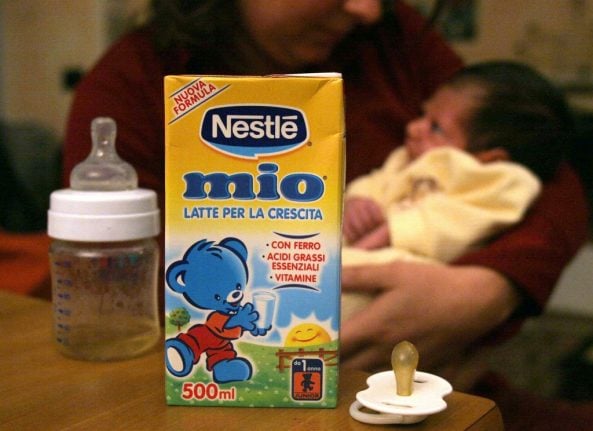Financial help: Italy plans new 'universal single allowance' for families from July

The Italian government is set to announce new measures to help families on Friday in a new decree.
Families will be able to access child benefit in the form of a universal allowance from July 1st, as indicated by Prime Minister Mario Draghi last month, according to newspaper La Repubblica.
The short-term plans are intended to cover groups of families that have so far been excluded from government family help, such as the disabled, unemployed and the self-employed.
The move is a temporary 'bridge allowance' for six months, after which it will become permanent, in a bid to help families and reverse the trend of falling birth rates.
READ ALSO: Fast trains and extended building bonus: How Italy’s EU recovery plan could affect you
Described as "era-changing" by the Italian Prime Minister and also praised by the pope, the universal single allowance forms part of the country's wider strategy, its so-called Family Act.
The plans are to be presented to the Council of Ministers today in the form of a decree law and are expected to outline how much families will receive in state funds per child.
A minimum of €30 to a maximum of €217.80 will be made available per month for each child. This is the plan for the next few months, valid from July to December 2021 for those who don't already receive family allowances.
Families eligible are those with an ISEE - the social and economic indicator of household income - of up to €50,000. How much a family can claim is also linked to the amount of children they have.
READ ALSO:
- What is Italy doing to increase its plummeting birth rate?
- Italy’s ‘baby bonuses’: What payments are available and how do you claim?
- ‘What it was like being pregnant during the pandemic in Italy’
The maximum monthly amount is €167.50 for the first and second child, which increases by 30% from the third child onwards.
Therefore, a family with two children can claim a maximum of €335 and it would rise to €653 for three children.
The figure decreases as the ISEE increases, going down to zero for a family with an ISEE of over €50,000.
In addition, an extra €50 will be provided for each disabled child.
The support will be on hand for dependent children up to the age of 21 and, from the age of 18, could be directly credited to the child if they are at university, enrolled in a vocational course, have a low-income job, are a trainee or doing community service.

Photo: Mario Laporta/AFP
It's expected €3 billion will be made to households overall, with over half of these funds going to groups currently ineligible to claim for family support. That also extends to employees who may be excluded due to overall family income.
For households who can currently access government family benefits, they too will receive a boost with an extra €37.50 per child up to two children and an extra €70 per child for those with three or more children.
For now, these funds will co-exist with other family bonuses, such as the baby bonuses.
Draghi stated during a speech at a conference in May that help is also coming in the form of “the construction of nurseries and kindergartens, the extension of full-time education and the strengthening of school infrastructure”.
“To parliament, I listed the measures for young people, women and families, present in the National Recovery and Resilience Plan,” he added.
Measures of around €21 billion are pledged in total, including incentives for companies “to hire more women and young people”.
Italy has long been experiencing a decline in birth rates, with just 404,000 children born in 2020, according to the national statistics body ISTAT.
READ ALSO: The real reasons young Italians aren't having kids
That’s the lowest number since the unification of Italy and marks an almost 30 per cent drop compared to ten years ago.
Italy has long counted among one of the lowest birth rates in Europe, and the situation has only been made worse by the coronavirus crisis.
It's expected the trend will continue this year, as Istat expects a further drop to 384,000-393,000 for 2021— largely due to an expected post-Covid baby bust across the world.
The universal single allowance can be accessed by anyone who pays taxes in Italy and has been resident in the country for at least two years.
Italian and EU citizens and holders of residence permits for work or research purposes for at least six months are eligible.
For those wishing to apply, Italy's social security and welfare system, INPS, is expected to publish a form online by 30th June.
Comments
See Also
Families will be able to access child benefit in the form of a universal allowance from July 1st, as indicated by Prime Minister Mario Draghi last month, according to newspaper La Repubblica.
The short-term plans are intended to cover groups of families that have so far been excluded from government family help, such as the disabled, unemployed and the self-employed.
The move is a temporary 'bridge allowance' for six months, after which it will become permanent, in a bid to help families and reverse the trend of falling birth rates.
READ ALSO: Fast trains and extended building bonus: How Italy’s EU recovery plan could affect you
Described as "era-changing" by the Italian Prime Minister and also praised by the pope, the universal single allowance forms part of the country's wider strategy, its so-called Family Act.
The plans are to be presented to the Council of Ministers today in the form of a decree law and are expected to outline how much families will receive in state funds per child.
A minimum of €30 to a maximum of €217.80 will be made available per month for each child. This is the plan for the next few months, valid from July to December 2021 for those who don't already receive family allowances.
Families eligible are those with an ISEE - the social and economic indicator of household income - of up to €50,000. How much a family can claim is also linked to the amount of children they have.
READ ALSO:
- What is Italy doing to increase its plummeting birth rate?
- Italy’s ‘baby bonuses’: What payments are available and how do you claim?
- ‘What it was like being pregnant during the pandemic in Italy’
The maximum monthly amount is €167.50 for the first and second child, which increases by 30% from the third child onwards.
Therefore, a family with two children can claim a maximum of €335 and it would rise to €653 for three children.
The figure decreases as the ISEE increases, going down to zero for a family with an ISEE of over €50,000.
In addition, an extra €50 will be provided for each disabled child.
The support will be on hand for dependent children up to the age of 21 and, from the age of 18, could be directly credited to the child if they are at university, enrolled in a vocational course, have a low-income job, are a trainee or doing community service.

Photo: Mario Laporta/AFP
It's expected €3 billion will be made to households overall, with over half of these funds going to groups currently ineligible to claim for family support. That also extends to employees who may be excluded due to overall family income.
For households who can currently access government family benefits, they too will receive a boost with an extra €37.50 per child up to two children and an extra €70 per child for those with three or more children.
For now, these funds will co-exist with other family bonuses, such as the baby bonuses.
Draghi stated during a speech at a conference in May that help is also coming in the form of “the construction of nurseries and kindergartens, the extension of full-time education and the strengthening of school infrastructure”.
“To parliament, I listed the measures for young people, women and families, present in the National Recovery and Resilience Plan,” he added.
Measures of around €21 billion are pledged in total, including incentives for companies “to hire more women and young people”.
Italy has long been experiencing a decline in birth rates, with just 404,000 children born in 2020, according to the national statistics body ISTAT.
READ ALSO: The real reasons young Italians aren't having kids
That’s the lowest number since the unification of Italy and marks an almost 30 per cent drop compared to ten years ago.
Italy has long counted among one of the lowest birth rates in Europe, and the situation has only been made worse by the coronavirus crisis.
It's expected the trend will continue this year, as Istat expects a further drop to 384,000-393,000 for 2021— largely due to an expected post-Covid baby bust across the world.
The universal single allowance can be accessed by anyone who pays taxes in Italy and has been resident in the country for at least two years.
Italian and EU citizens and holders of residence permits for work or research purposes for at least six months are eligible.
For those wishing to apply, Italy's social security and welfare system, INPS, is expected to publish a form online by 30th June.
Join the conversation in our comments section below. Share your own views and experience and if you have a question or suggestion for our journalists then email us at [email protected].
Please keep comments civil, constructive and on topic – and make sure to read our terms of use before getting involved.
Please log in here to leave a comment.